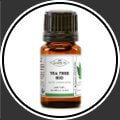Essential oils are known to effectively treat many health problems. Some are particularly effective if you are dealing with a wet cough. A wet cough is not a disease, but a symptom, a reaction to a problem generally linked to the respiratory system (bronchitis, winter viruses, infections, flu, etc.). Autumn and rainy days are therefore risky periods. Although unsightly and unpleasant, you should definitely not try to contain it because it helps to evacuate the microbes and other bacteria causing your problem. Aromatherapy also comes to your aid and allows you not only to cure wet cough, but also to prevent its occurrence. You will find in our file our selection of the best essential oils for coughs as well as several simple and effective recipes to treat the symptoms or to use for prevention.


Diffusion of essential oils against wet cough
Ingredients:
- 2 drops ofglobular eucalyptus essential oil
- 2 drops ofravintsara essential oil
- 3 drops ofniaouli essential oil
How to use it ?
Mix these ingredients in your diffuser and diffuse for 30 minutes per day. Repeat the diffusion for 3 to 5 days. Practice diffusion at the first signs of cough in order to get rid of it as quickly as possible and avoid the spread of viruses and the risk of transmission to other people. The diffusion of essential oils helps to purify the air and purify your bronchi.Do not use in pregnant or breastfeeding women and children under 10 years old.

Synergy of essential oils against bronchitis accompanied by fatty coughs
Probably one of the simplest and most effective recipes!
Ingredients:
- 50ml ofhazelnut vegetable oil
- 2ml ofmyrtle essential oil
- 2ml ofravintsara essential oil
- 1ml d'radiated eucalyptus essential oil
How to use it ?
Mix all the ingredients in a bottle and start the massages at the first signs of wet cough in circular movements on the chest. Repeat the massages 3 times a day for 4 to 5 days.Do not use in pregnant or breastfeeding women and children under 8 years old.

Anti-fat cough balm with radiated eucalyptus essential oil
Ingredients:
- 10g Shea Butter
- 5g ofcoconut oil
- 0.5g of beeswax
- 30 drops ofradiated eucalyptus essential oil
- 25 drops ofmyrtle essential oil
- 10 drops ofrosemary verbenone essential oil
How to use it ?
In a bowl, mix the beeswax, shea butter and coconut oil. When the wax and oils have completely melted, remove the bowl from the heat and allow the mixture to cool slightly. Then add the essential oils and pour everything into a jar. Keep the preparation in the fridge and use the balm at the first signs of cough by massaging the chest and back before sleeping for 3 to 4 days.Do not use in pregnant or breastfeeding women and children under 10 years old.

Inhaled: free your bronchi with essential oils
Free and soothe your bronchi:
Ingredients:
- 1 drop ofradiated eucalyptus essential oil (globular eucalyptus if the cough is very severe, but only for adults)
- 1 drop of essential oil Roman chamomile
- 1 drop ofravintsara essential oil
How to use it ?
In 1 liter of hot water, disperse these essential oils. Stand above the vapors and cover your head with a towel. Breathe the vapors through your nose and mouth for 10 to 15 minutes. Steam baths help to soften secretions and free your bronchi more quickly.Little tip: You can also take the opportunity to apply a mask after the steam bath because your pores will be perfectly dilated.
Do not use in pregnant or breastfeeding women and children under 8 years old.
Contraindications:
These synergies should not be used in pregnant women (during the entire pregnancy), breastfeeding women and children under 7 years old.
These properties and methods of use do not constitute medical advice. For therapeutic use consult a doctor.

The action of essential oils against wet coughs
Essential oils will intervene on several levels. Some will help you treat the disease thanks to their properties, for example antibacterial, antifungal, antiviral, anti-inflammatory. Others will be very valuable for thinning secretions and promoting their evacuation (this is the whole point of treating wet cough). Still others can have a calming effect if the bronchi are irritated, for example.
If your cough persists, consult a doctor immediately. In case of doubt or specific or worrying symptoms, self-medication is not recommended; advice and examination by a doctor is necessary.
These properties and methods of use do not constitute medical advice. For therapeutic use, consult medical advice.

Radiated eucalyptus essential oil:
It is the essential oil par excellence against infections of the respiratory system. Anti-infectious, antibacterial, antiviral, mucolytic, it thins secretions and helps to evacuate them quickly.
Globular eucalyptus essential oil is even more powerful but rather reserved for adults (mainly in cases of bronchitis).
Warning: Do not use eucalyptus essential oil in pregnant or breastfeeding women. Dilute heavily.

Myrtle essential oil:
Its antispasmodic properties will relieve your cough, its powerful expectorant and antiseptic properties will help free your bronchi. When diffused, it very effectively purifies the air and prevents the spread of infections.
Warning: Prohibited for pregnant or breastfeeding women and children under 10 years old.

Cypress essential oil:
Thanks to its antitussive properties, cypress essential oil helps thin secretions and relieve your wet cough. When diffused, it purifies the air and chases away microbes responsible for respiratory system infections. It can also be used in case of dry cough.
Warning: Do not use pure organic cypress essential oil on the skin (irritant essential oil), always diluted in a vegetable oil. Do not use in cases of mastosis and hormone-dependent cancer. Do not use in pregnant or breastfeeding women and children under 8 years old. No prolonged use.

Rosemary verbenone essential oil:
Expectorant and mucolytic, it acts on all problems in the ENT sphere and fights common respiratory infections such as bronchitis or coughs.
Warning: Rosemary verbenone essential oil is prohibited for pregnant or breastfeeding women and children. It is contraindicated for epileptics and prohibited for children.

Rosewood essential oil:
Effectively fights ENT and bronchial infections. It also has anti-inflammatory and anti-infectious properties.
Warning: Prohibited during the first 3 months of pregnancy, for breastfeeding women and children under 8 years old. Dilute in fatty oil.

Wet cough - how to prevent it and avoid infecting your loved ones?
Since cough is not an illness, we cannot prevent its occurrence, but only the illnesses associated with it. Cough is usually caused by respiratory infections. It is therefore necessary to take certain precautions to prevent their appearance:
Ventilate your house regularly, especially in winter. Hot air encourages the proliferation of microbes and therefore their development in our lungs. To avoid it, ventilate your bedroom in the morning and one hour before going to bed. You can combine space ventilation with a diffusion of essential oils to purify the air and give you strength and energy in the morning or relax in the evening.
Avoid overheating your home. Heat promotes the development of microbes and infections. The Ministry of Health recommends maintaining the temperature of your home at 19 degrees. Additionally, sleeping in a cool bedroom has been proven to improve your sleep, brighten your complexion and reduce swelling.
Wash your hands regularly. Before any activity at home, wash your hands as soon as you get home. Watch your children and force them to do the same. Don't forget the adults! some do not take hand washing seriously even though it is an important vector of various contamination.
Blow your nose with paper tissues (to prevent the proliferation of microbes). Prefer paper handkerchiefs to fabric handkerchiefs which must be stored and washed afterwards. You risk the proliferation of germs because these handkerchiefs must be washed separately and at a temperature of 90 degrees.
This seems obvious, but avoid shaking hands and kissing when you are sick. You risk infecting other people around you. You also risk catching the microbe again.
Avoid putting your hand over your mouth when you cough. Instead, use the inside of your elbow or a disposable tissue. By putting your hand, you will cover it with germs and thus transmit these germs to everyone who will touch your belongings or open the same door as you.

Better understand wet cough!
A wet cough is usually a reaction to an infection. It affects nearly 70% of the population each winter.
A wet cough is considered a “useful” cough because it helps flush out microbes and frees the bronchi. A cough in itself is not an illness - it is a symptom of a respiratory problem (bronchitis, flu, etc.) or a lung infection.
It is triggered by a reflex from our immune system in order to get rid of clutter (microbes, pollen, dust, etc.).
In addition to colds, bronchitis and allergies, wet cough can also appear in cases of serious illnesses of the respiratory system such as pneumonia, asthma, tuberculosis, lung abscess, lung cancer. At the slightest doubt (worsening, fever, pain, etc.), it is important to consult a doctor so that he can rule out these diseases of the respiratory system and make a precise diagnosis.

Our simple tips to relieve and help you get rid of a wet cough:
- Drink at least 1.5 liters of water per day (preferably lukewarm or hot) to thin sputum.
- Apply your essential oil preparation at the first signs of a wet cough. The sooner you apply, the easier it will be to get rid of it.
- Ventilate your home at least in the morning and evening.
- Do not smoke to avoid further irritating your respiratory tract, at least for the first week following symptoms.
- Use disposable tissues so as not to contaminate those around you.
- Wash your hands regularly or use an anti-bacterial gel.
- Avoid overheating your home.
- Consult a doctor if your symptoms persist or if there is any doubt.
 OUR
OUR